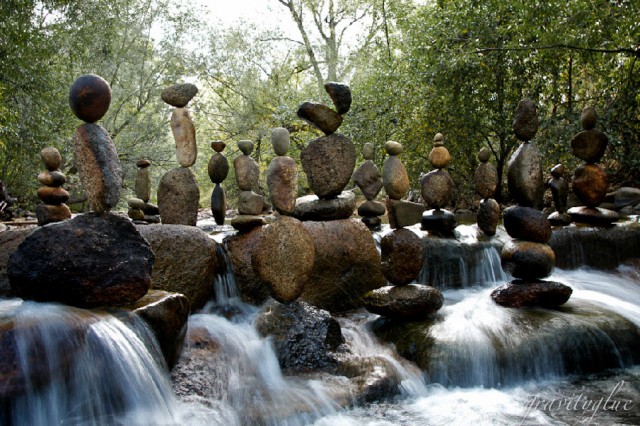Removing rocks from the stream bed or stream edge to stack or throw can be aesthetically pleasing, but very damaging to the habitat you remove them from in both the short and long term. In the short term you are altering water currents, potentially speeding up certain areas and slowing down others which not only displaces wildlife in both of those areas, but may result in neither being suitable for habitation. It also creates a cascading effect in water flow, causing sediment to settle in areas of what is now slow flow and increasing erosion in areas of high speed flow. This disturbs the physical environment of the waterway, as well as its chemical (nutrient), chronological (change over time) development, and oxygenation.
In the long term, moving rocks brings about another issue, which is erosion. All waterways are shaped by erosion, and a rule in geology is the bigger the rock, the more force it takes to move. This rule is universal from boulders all the way down to individual clay particles. Your ability as a person to lift an even moderately sized rock has a monumental impact on the dynamics of the waterway. In some areas, a rock that may fit in just the palm of your hand might only be able to be moved by a once in a generation flood event. A stack of 3 or 4 of these rocks removes the equivalent of HUNDREDS of years of potential habitats, oxygen infusion into the water, or accelerates/decelerates the rate of erosion in the area you removed/added the rocks by hundreds of years. Simultaneously, you are impacting the riparian zone (edge of the waterway), an incredibly important habitat for terrestrial, aquatic, and amphibious plant and animal life. Changes erosion at the edge of a stream, river, or lake impact the whole body of water in all of the same ways as listed above.
Knowing when not to intervene is an equally important aspect of being a good steward to your natural environment as knowing when to intervene. Let nature do it’s thing and you’ll have even more beauty to enjoy when you are surrounded by it

Do you see rocks stacked like this without human interference? Wildlife has not adapted to live in towers of rock, it has adapted to live where the removed the rocks used to be. Waterways are a very sensitive habitat, and while you may think taking a few rocks here and there does not have an impact, it very much does. It impacts water speed, nutrient composition, TDS, dissolved oxygen, and this is without even getting to the physical alteration of the habitats.
Humans are a part of nature indeed, but humans also have the wisdom to learn how they are harming the environment by acting in ways the non-human world does not.
Not without human interference. But my point is homo sapiens and ancestors/relatives have been doing stuff like 'stack rocks' for well over two hundred thousand years, quite plausibly two million plus years, that is basically nature.
I struggle to believe there's evidence that moving some rocks has any non-negligible effect on local populations or biodiversity. Life is very, very, rarely as fragile as you describe. But please share if there is indeed such evidence and I'll change me mind.
And you personally are not nearly as in touch with nature as your ancestors which relied on it directly to survive. They knew what water flow would result in less fish spawn, what the amphibians needed to eat to survive, etc.
You are a much more casual observer of nature. You are a guest who does not need to alter it for your survival, and you are wise enough to learn how your actions are detrimental to it. You and I both know that “humans are a part of nature” is not a good reason to cause active harm to it when you know better. Messing with the commons because you personally find it aesthetically pleasing is just as bad as harming the commons for any other reason, perhaps worse since you have nothing to gain from materially harming it in this way. Why do you think literally every national park asks you to leave no trace?
In regards to your “struggling to believe”
Stone-stacking as a looming threat to rock-dwelling biodiversity
30 species of salamander in Smokey Mountain NP are at risk because of stream alteration like rock stacking or damming
Riparian zones suffer from increased human disturbances and the plant communities change unpredictably in response to altered conditions
Human effects can result from activities within the watershed that indirectly affect streams by altering the movement of water, sediment, and contaminants into the channel.
Aye, well there are two aspects here - one, thanks for the evidence, that's cool, I concede the point. And two, this is clearly an american phenomenon that is much more prevalent than I ever would've imagined.
So given the context and info, I very much concede my point and appreciate the educating, thank you!
Oxygen used to be poison.
Is it valuable to try and restore the world to the state it was when most species were poisoned by oxygen?
There is a deep problem with mythologizing the present state of the world as 'valuable'. It is totally arbitrary because you are essentially picking one point among infinite to value.
Oh PLEASE lmaoooooooo spare me. Yes, clearly my post is advocating for a return of the earth to the era of stromatolites. Make Earth Mesoproterozoic again!
Nobody is mythologizing the present state of the world, but it is objectively valuable to have intact natural spaces. Get this fake deep shit out of here and respect the commons